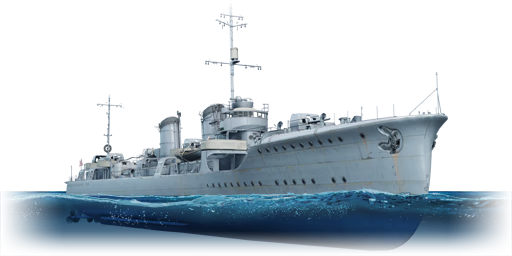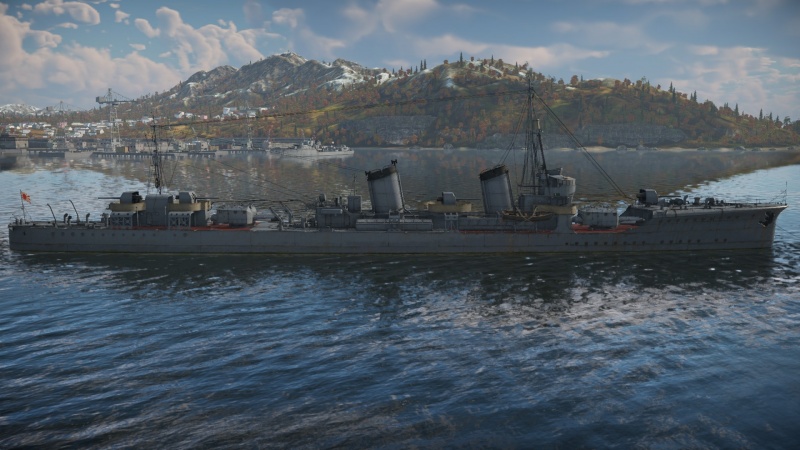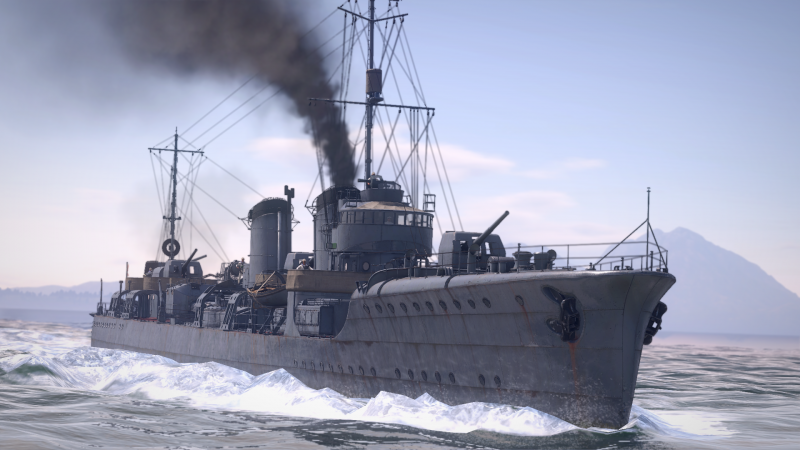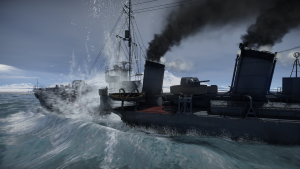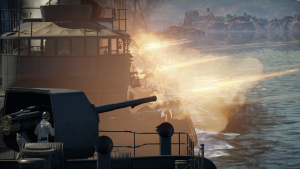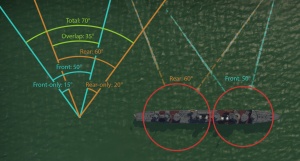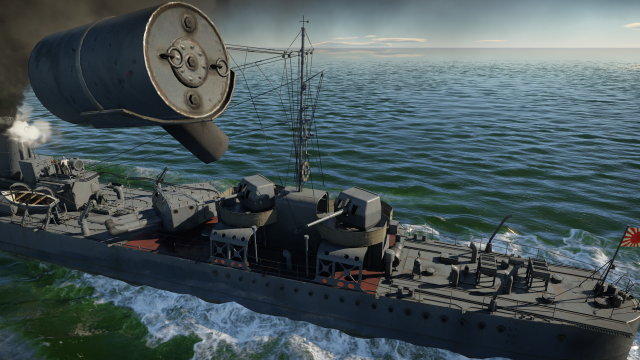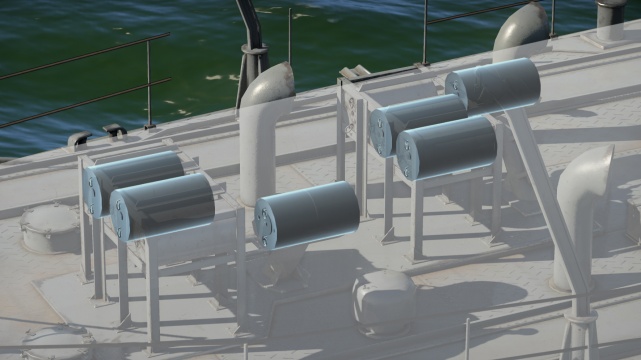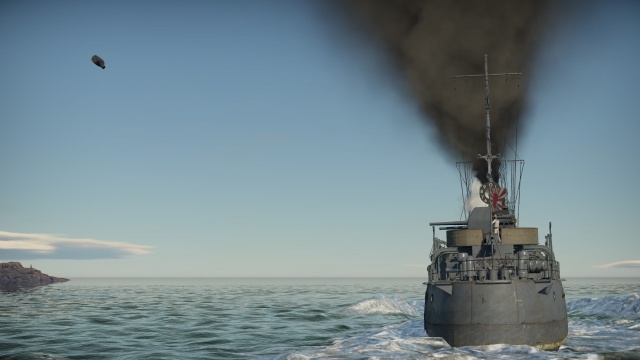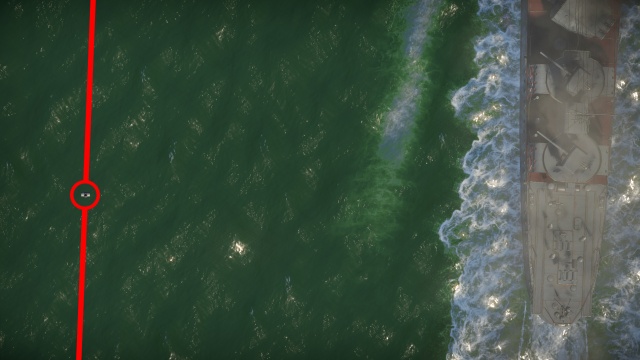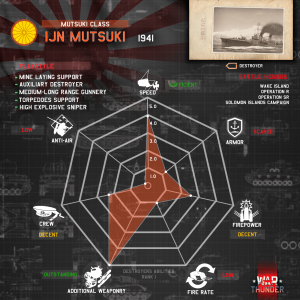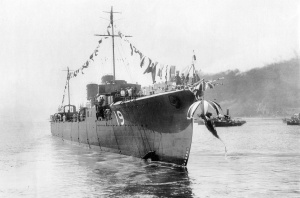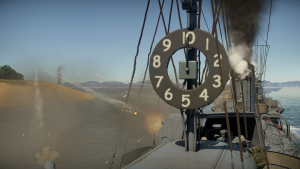Difference between revisions of "IJN Mutsuki"
m |
Jareel_Skaj (talk | contribs) (→Pros and cons: Clarified the performance of the main guns) |
||
| (6 intermediate revisions by 3 users not shown) | |||
| Line 1: | Line 1: | ||
| − | |||
| − | |||
| − | |||
| − | |||
| − | |||
{{Specs-Card | {{Specs-Card | ||
|code=jp_destroyer_mutsuki | |code=jp_destroyer_mutsuki | ||
| Line 11: | Line 6: | ||
== Description == | == Description == | ||
<!-- ''In the first part of the description, cover the history of the ship's creation and military application. In the second part, tell the reader about using this ship in the game. Add a screenshot: if a beginner player has a hard time remembering vehicles by name, a picture will help them identify the ship in question.'' --> | <!-- ''In the first part of the description, cover the history of the ship's creation and military application. In the second part, tell the reader about using this ship in the game. Add a screenshot: if a beginner player has a hard time remembering vehicles by name, a picture will help them identify the ship in question.'' --> | ||
| − | The '''{{Specs|name}}''' (睦月, [[Abbreviations#.28JP.29_Naval|namesake]]: January) | + | The '''{{Specs|name}}''' (睦月, [[Abbreviations#.28JP.29_Naval|namesake]]: January) was the lead ship of the [[Mutsuki (Family)|Mutsuki-class destroyers]], which were ordered in 1923 after the Washington Navy Treaty restricted the size and number of capital warships. Due to their nature of being planned as a means for unrestricted rapid expansion of the fleet, names weren't assigned to her class until 1928 after crew dissatisfaction and communication problems. Being an improvement over the previous Kamikaze-class destroyer, she saw service in the Sino-Japanese conflicts, and escorted combat fleets during WWII until her sinking at the Battle of the Eastern Solomons. |
{{PAGENAME}} was introduced in [[Update 1.89 "Imperial Navy"]]. She is the first destroyer most players will play within the Japanese tree, and gameplay differs significantly from analogous coastal vessels such as the [[Syonan]]. The ship is very much a destroyer geared towards long-range engagements, having the most powerful primary armament and the second-most-powerful torpedo setup among its battle rating, further increasing its performance in gunnery battles with relatively good armour. On the other hand, it has only two, very weak, auxiliary guns and no dedicated anti-aircraft weaponry, making it a poor performer in close-range encounters. Overall, it's a difficult ship to play, posing a number of challenges to a player. | {{PAGENAME}} was introduced in [[Update 1.89 "Imperial Navy"]]. She is the first destroyer most players will play within the Japanese tree, and gameplay differs significantly from analogous coastal vessels such as the [[Syonan]]. The ship is very much a destroyer geared towards long-range engagements, having the most powerful primary armament and the second-most-powerful torpedo setup among its battle rating, further increasing its performance in gunnery battles with relatively good armour. On the other hand, it has only two, very weak, auxiliary guns and no dedicated anti-aircraft weaponry, making it a poor performer in close-range encounters. Overall, it's a difficult ship to play, posing a number of challenges to a player. | ||
| − | |||
== General info == | == General info == | ||
[[File:Torpedoed Mutsuki.png|thumb|Mutsuki can survive a direct torpedo hit|left]] | [[File:Torpedoed Mutsuki.png|thumb|Mutsuki can survive a direct torpedo hit|left]] | ||
| Line 58: | Line 52: | ||
Within its battle rating. {{PAGENAME}} has both the highest number of and the highest calibre of primary guns. Its guns also have a second-highest muzzle velocity. That said though, it comes with a price - its shells are slow to reload, leading to the lowest sustained rate of fire among comparable destroyers. At the same time, damage output against warships is not as great as reload time might suggest, although still, it's able to hullbreak almost any boat bar some unlucky hits at full-health units. Unfortunately for captains of the Mutsuki, the primary armament has a woeful turret traverse speed of 5°/sec (aced), making it difficult to switch targets and decreasing the overall versatility significantly. It would be very difficult to take the Mutsuki into more confined spaces as the turrets rotate far too slowly to deal with multiple torpedo boats or other craft. | Within its battle rating. {{PAGENAME}} has both the highest number of and the highest calibre of primary guns. Its guns also have a second-highest muzzle velocity. That said though, it comes with a price - its shells are slow to reload, leading to the lowest sustained rate of fire among comparable destroyers. At the same time, damage output against warships is not as great as reload time might suggest, although still, it's able to hullbreak almost any boat bar some unlucky hits at full-health units. Unfortunately for captains of the Mutsuki, the primary armament has a woeful turret traverse speed of 5°/sec (aced), making it difficult to switch targets and decreasing the overall versatility significantly. It would be very difficult to take the Mutsuki into more confined spaces as the turrets rotate far too slowly to deal with multiple torpedo boats or other craft. | ||
| − | Unlike most of the other nations, and typically to IJN rank | + | Unlike most of the other nations, and typically to IJN rank II destroyers, it lacks armour-piercing shells for its primary armament what can be an issue when trying to deal with higher ranks. Alternative to standard HE is a researchable modification bringing in the Type 0 time fuse HE shells. Dedicated primarily for anti-aircraft duty, while very potent, the low number of fired shells and long reload time make for a hard choice and a very tricky way to protect itself from airborne attacks. |
=== Secondary armament === | === Secondary armament === | ||
| Line 106: | Line 100: | ||
=== Pros and cons === | === Pros and cons === | ||
<!-- ''Summarise and briefly evaluate the vehicle in terms of its characteristics and combat effectiveness. Mark its pros and cons in the bulleted list. Try not to use more than 6 points for each of the characteristics. Avoid using categorical definitions such as "bad", "good" and the like - use substitutions with softer forms such as "inadequate" and "effective".'' --> | <!-- ''Summarise and briefly evaluate the vehicle in terms of its characteristics and combat effectiveness. Mark its pros and cons in the bulleted list. Try not to use more than 6 points for each of the characteristics. Avoid using categorical definitions such as "bad", "good" and the like - use substitutions with softer forms such as "inadequate" and "effective".'' --> | ||
| − | [[File:Radar_chart_IJN_Mutsuki.png|thumb|Destroyers abilities of the | + | [[File:Radar_chart_IJN_Mutsuki.png|thumb|Destroyers abilities of the destroyer IJN Mutsuki]] |
'''Pros:''' | '''Pros:''' | ||
| − | |||
* Excellent max speed | * Excellent max speed | ||
| + | * Good survivability | ||
| + | * Her main guns are excellent, giving her the ability to outgun nearly all destroyers and coastal vessels in her BR, whether with HE or SAP rounds. However, the gun handling often makes it challenging to fully utilise all four turrets. | ||
* Outstanding, long-range torpedoes (in particular after unlocking Torpedo Mode) | * Outstanding, long-range torpedoes (in particular after unlocking Torpedo Mode) | ||
| − | |||
'''Cons:''' | '''Cons:''' | ||
Latest revision as of 17:27, 10 November 2024
Contents
Description
The Mutsuki-class, IJN Mutsuki, 1941 (睦月, namesake: January) was the lead ship of the Mutsuki-class destroyers, which were ordered in 1923 after the Washington Navy Treaty restricted the size and number of capital warships. Due to their nature of being planned as a means for unrestricted rapid expansion of the fleet, names weren't assigned to her class until 1928 after crew dissatisfaction and communication problems. Being an improvement over the previous Kamikaze-class destroyer, she saw service in the Sino-Japanese conflicts, and escorted combat fleets during WWII until her sinking at the Battle of the Eastern Solomons.
IJN Mutsuki was introduced in Update 1.89 "Imperial Navy". She is the first destroyer most players will play within the Japanese tree, and gameplay differs significantly from analogous coastal vessels such as the Syonan. The ship is very much a destroyer geared towards long-range engagements, having the most powerful primary armament and the second-most-powerful torpedo setup among its battle rating, further increasing its performance in gunnery battles with relatively good armour. On the other hand, it has only two, very weak, auxiliary guns and no dedicated anti-aircraft weaponry, making it a poor performer in close-range encounters. Overall, it's a difficult ship to play, posing a number of challenges to a player.
General info
Survivability and armour
The IJN Mutsuki is relatively well armoured and survivable destroyer for its battle rating. Following the typical research path through the Japanese tree, this will be the first ship that's not prone to fires and the first one able to survive a single direct torpedo hit (unless it leads to a secondary explosion).
The destroyer has armour protection and crew count that are above average, although the differences between destroyers in battle rating 3.7 are not high. Protection can be further enhanced with several modifications, although they're standard on all other comparable destroyers as well.
The biggest issue in the ship's survivability is its lack of anti-aircraft armament. It's equipped only with two 7.7 mm auxiliary machine guns that are hardly useful even against wooden gunboats and nearly incapable of taking down anything airborne. Thus, the IJN Mutsuki has to rely on a cover of other ships or time fuse 120 mm shells for protection.
Mobility
With a speed of 62 km/h before any modifications, the IJN Mutsuki is the fastest destroyer within its battle rating. Decent speed is supplemented by good manoeuvrability, making it capable of choosing engagements and occasionally even avoiding torpedoes other destroyers would not. The aced top speed is 69 km/h, which is easy enough to get around the battlefield. The rudder shift time is also very respectable, allowing for dodging patterns and making it a hard target to hit with torpedoes.
| Mobility Characteristics | |||||
|---|---|---|---|---|---|
| Game Mode | Upgrade Status | Maximum Speed (km/h) | Turn Time (s) | Turn Radius (m) | |
| Forward | Reverse | ||||
| AB | Stock | 62 | 29 | ~135.98 | ~258.51 |
| Upgraded | 84 | 40 | ___ | ___ | |
| RB/SB | |||||
| Upgraded | 69 | 32 | ___ | ___ | |
Modifications and economy
After researching Tool Set and FPE, the primary research focus should be in Seakeeping and Unsinkability towards tier IV where Torpedo Mode is a worthy upgrade. The lowest priority upgrades are those for the 7.7 mm auxiliary machine guns and, of course, bomb mortar. Note that even with fully upgraded speed and manoeuvrability, primary turrets still handle emergency turns well, making targeting upgrades a lower priority on the list.
Armament
Primary armament
| Penetration statistics | |||||||
|---|---|---|---|---|---|---|---|
| Ammunition | Type of warhead |
Penetration @ 0° Angle of Attack (mm) | |||||
| 1,000 m | 2,500 m | 5,000 m | 7,500 m | 10,000 m | 15,000 m | ||
| 120 mm Type 1 HE | HE | 24 | 24 | 24 | 24 | 24 | 24 |
| 120 mm Type 1 SAP | SAP | 114 | 89 | 59 | 40 | 30 | 26 |
| 120 mm Type 0 HE | HE-TF | 24 | 24 | 24 | 24 | 24 | 24 |
| Shell details | ||||||||||||
|---|---|---|---|---|---|---|---|---|---|---|---|---|
| Ammunition | Type of warhead |
Velocity (m/s) |
Projectile mass (kg) |
Fuse delay (s) |
Fuse sensitivity (mm) |
Explosive mass (TNT equivalent) (kg) |
Ricochet | |||||
| 0% | 50% | 100% | ||||||||||
| 120 mm Type 1 HE | HE | 850 | 20.33 | 0 | 0.1 | 1.95 | 79° | 80° | 81° | |||
| 120 mm Type 1 SAP | SAP | 850 | 20.4 | 0.015 | 5 | 1.87 | 47° | 60° | 65° | |||
| 120 mm Type 0 HE | HE-TF | 850 | 20.33 | 0 | 0.1 | 1.95 | 79° | 80° | 81° | |||
The IJN Mutsuki is armed with four single 120 mm mounts, one in the bow, one just aft of the bridge in between the funnels, and two towards the aft. It's comparatively a powerful weaponry excelling especially at longer ranges against its equivalents.
All but the rearmost turrets aim forwards by default, making it relatively easy to hit targets ahead of her with her guns. Additionally, since they are all centrally mounted, it is possible to get all four turrets on target, although when making a turn rear-most turret has to travel over 180° to get a bearing on the target.
Within its battle rating. IJN Mutsuki has both the highest number of and the highest calibre of primary guns. Its guns also have a second-highest muzzle velocity. That said though, it comes with a price - its shells are slow to reload, leading to the lowest sustained rate of fire among comparable destroyers. At the same time, damage output against warships is not as great as reload time might suggest, although still, it's able to hullbreak almost any boat bar some unlucky hits at full-health units. Unfortunately for captains of the Mutsuki, the primary armament has a woeful turret traverse speed of 5°/sec (aced), making it difficult to switch targets and decreasing the overall versatility significantly. It would be very difficult to take the Mutsuki into more confined spaces as the turrets rotate far too slowly to deal with multiple torpedo boats or other craft.
Unlike most of the other nations, and typically to IJN rank II destroyers, it lacks armour-piercing shells for its primary armament what can be an issue when trying to deal with higher ranks. Alternative to standard HE is a researchable modification bringing in the Type 0 time fuse HE shells. Dedicated primarily for anti-aircraft duty, while very potent, the low number of fired shells and long reload time make for a hard choice and a very tricky way to protect itself from airborne attacks.
Secondary armament
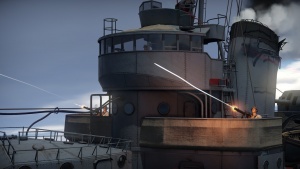
The secondary armament of the Mutsuki is two type 92 7.7 mm machine guns, each with 1,940 rounds of ammunition. The mountings are both abreast of the bridge, giving good all-around coverage, but no overlapping arcs of fire except for the narrow frontal arc. They do virtually no damage and cannot be relied upon for defence against boats or aircraft.
Note that these are auxiliary weapons, not anti-aircraft, therefore they won't use crew upgrades for anti-aircraft weaponry, even though they are single-mount machine guns with vertical guidance of +60 degrees, making them often automatically engage aircraft.Additional armament
The IJN Mutsuki carries two triple centre mountings for 610 mm Type 90 torpedoes, along with 6 reload torpedoes in lockers alongside the rearmost funnel. This gives it the ability to reload mid-battle. Each torpedo has a 480 kg TNT equivalent warhead and travels for 7 km at 85 km/h.
This gives it the best torpedo count, torpedo speed and damage at its rank and the second-best range that can be upgraded to by far the longest range through the Torpedo Mode modification that adds 8,000 m for a total of 15 km range, making it capable of reaching opposing spawn area within nearly all maps played on the ship's battle rating.
IJN Mutsuki's torpedo firing arcs are tricky to use. When switching between torpedo aiming modes, the first one to select is for the frontal mount, which not only has a narrower firing arc of the two but its available firing arc is oriented towards the rear of the ship. This creates a situation where most of the unknowing players would only use a very narrow 35° arc, where the first launcher begins to be able to release torpedoes after coming about. Therefore, when manoeuvring bow-first towards the enemy, switch to the rear launcher first; when manoeuvring stern-first towards the enemy, use the front launcher first.
The IJN Mutsuki has an unlockable modification to equip Type 95 depth charges mounted on the Bomb Mortar. It's a tier IV modification, making a comparatively difficult to unlock. It's the only one of two destroyers within its battle rating to be equipped with that modification, making it a fairly unique ship equipment. Mutsuki comes equipped with two mortars: port and starboard, each having one charge loaded and up to 3 spares. Charges cannot be loaded interchangeably, therefore only 4 are available to launch port and 4 starboard. Charges after ejection will be dropped at a constant distance away from the ship, the player has only control over which side should the charges be ejected on. Depth charges cannot be equipped onboard Mutsuki without the bomb mortar, it's the only way they can be deployed.
Charges are extremely situational, and due to a very short range, they are dropped on they are one of the most tricky weapons to use on any destroyer. Even more so, given that their primary target - submarines - are not available in the game.
Usage in battles
IJN Mutsuki is one of the more challenging destroyers in the game, forcing players to rely on positioning, primary weaponry and other teammates.
Her combination of good survivability with speed and long-range cannons make for a respectable fighter at range, however, the lack of secondaries create huge opportunities for hostile torpedo boats or aircraft. IJN Mutsuki in essence is forced to rely on friendlies, is best used in formation assisting other ships, using the cover of their anti-aircraft and trying to always keep hostiles at over 2.5 km, away from the range of their auxiliary guns firing back.
While maps the IJN Mutsuki will fight on include small, narrow passages, those should be avoided for the fear of enemy boats - lack of secondary armament combined with slow, cruiser-like reload time on the primary cannons make for a very challenging task to destroy hostile torpedo boats, and being a destroyer: it has overall a poor manoeuvrability and a large size compared to many opponents it will face, making for a juicy target.
Overall, IJN Mutsuki has a very steep learning curve, where the player simultaneously has to master positioning in warships, leads on various targets at various ranges and long-range torpedo gameplay.
Pros and cons
Pros:
- Excellent max speed
- Good survivability
- Her main guns are excellent, giving her the ability to outgun nearly all destroyers and coastal vessels in her BR, whether with HE or SAP rounds. However, the gun handling often makes it challenging to fully utilise all four turrets.
- Outstanding, long-range torpedoes (in particular after unlocking Torpedo Mode)
Cons:
- Very vulnerable from the air
- Very vulnerable to attacks from multiple angles
- In essence no secondary or anti-aircraft armament
- The longest reload time on the primary guns among comparable destroyers
History
As the Washington Naval Treaty entered effect, where it substantially limited the quantity of naval weaponry available to the signatory nations, Japan began developing more advanced naval designs to better parry the might of the U.S. Navy.
One such design was the Mutsuki-class destroyers, developed in the early 1920s. Although intended as an improvement over the preceding Kamikaze-class, the Mutsuki-class would become outdated the moment it entered service due to the fact that the even more advanced Fubuki-class was developed in parallel. Nonetheless, Mutsuki-class destroyers still had a prolific service life during WW2, even in the later stages when most were converted into transport vessels.
Mutsuki, the lead ship of her class, was laid down in May 1924 at the Sasebo Naval Arsenal shipyard and was completed in March 1926. The ship was initially commissioned under the name Destroyer No.19, only receiving the name 'Mutsuki' in August 1928.
Mutsuki's combat record began with the outbreak of the Second Sino-Japanese War between China and Japan in the early 1930s. The first battle involving the destroyer during WWII was the invasion of Wake Island. Following the invasion, Mutsuki took part in many more major operations in the Pacific, such as the invasions in the Solomon Islands, New Guinea and Rabaul, while also participating in the Battle of the Coral Sea in 1942.
After undergoing repairs in July 1942, Mutsuki was reassigned to the 8th Fleet and participated in the bombardment of Henderson Field on 24 August 1942. However, Mutsuki met her fate the following day, after an American B-17 Flying Fortress bomber managed a direct hit on the ship's mid section during the Battle of the Eastern Solomons. Mutsuki sunk on that fateful August day and was subsequently struck from Naval records in October 1942.
- From Devblog
Clock on a rear mast
The clock clearly visible on a rear mast of the Mutsuki and certain other destroyers is in fact a Range Dial (also known as Concentration Dial).
It enables other ships in a formation that are either behind smoke screen, with a broken range-finders or otherwise have their sight of the enemy hampered to take firing data from a friendly ship.
This technique was first introduced in the British Navy and subsequently adopted throughout other countries until being fully replaced by a short-range radio communications in 1930s, with some ships still bearing the clocks even up to the early days of the WW2.
Range dials are not functional in the game, they're purely visual part of the ship.
Media
- Skins
See also
Links to articles on the War Thunder Wiki that you think will be useful for the reader, for example:
- reference to the series of the ship;
- links to approximate analogues of other nations and research trees.
External links
| Sasebo Naval Arsenal (佐世保海軍工廠) | |
|---|---|
| Destroyers | |
| Mutsuki-class | IJN Mutsuki |
| Hatsuharu-class | IJN Hatsuharu |
| Shiratsuyu-class | IJN Yuudachi |
| Light Cruisers | |
| Agano-class | IJN Agano |
| Unique Ships | IJN Yubari |
| Tanks | Chi-Ha Short Gun |
| Japan destroyers | |
|---|---|
| IJN | |
| Momi-class | IJN Momi |
| Mutsuki-class | IJN Mutsuki · IJN Satsuki |
| Fubuki-class | IJN Ayanami |
| Hatsuharu-class | IJN Hatsuharu · IJN Nenohi |
| Shiratsuyu-class | IJN Yuudachi |
| Yugumo-class | IJN Yugumo · IJN Hayanami · IJN Kiyoshimo |
| Shimakaze-class | IJN Shimakaze |
| Akizuki-class | IJN Akizuki · IJN Hatsuzuki |
| JMSDF | |
| Ariake-class* | JDS Yūgure (DD-184) |
| Harukaze-class | JDS Harukaze (DD-101) |
| Murasame-class | JDS Murasame (DD-107) |
| * Modified Fletcher-class destroyers | |


